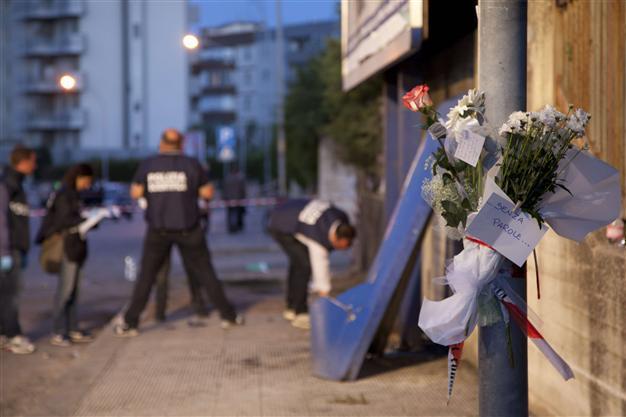Italy arrests two in school bomb attack
BRINDISI, Italy - Agence France-Presse

Flowers are displayed on the site of a blast near a school in Brindisi on May 19, 2012. AFP Photo
Italian police have arrested two suspects over the bombing of a
school that killed a 16-year-old girl and seriously injured five more teenagers, media reports said here today.
"The trail the police are following is that of a terrorist act," the daily Corriere della Sera said.
The men were identified from security cameras at the vocational school in the southern city of Brindisi where the
bomb ripped through a group of students as they waited to begin classes early Saturday.
One of the suspects is an ex-soldier with knowledge of electronics, said the newspaper, citing local news website Brindisireport.
Police have carried out a search of the suspects' homes, it said.
Italy was in shock after the bombing, which revivied memories of attacks by political militants and powerful mafia groups.
Italy's flags flew at half mast and the Adriatic port city held the first of two days of mourning for Melissa Bassi, who died from her injuries in hospital, an only child from a working class family who was studying to be a social worker.
Another young victim was fighting for her life after suffering extensive injuries to her chest and another was badly wounded in the legs.
Italian Prime Minister Mario Monti condemned the bombing as tragic and criminal, on the sidelines of the G8 summit in the United States.
The victims had all been scorched by the blast, caused by three gas canisters and a timer, with doctors and witnesses describing flying shrapnel and their blackened bodies on the ground.
Thousands of young people spontaneously took to the streets of Italy's main cities in emotional demonstrations against the violence, which many protesters blamed on a rising climate of social tension linked to a steep economic crisis.
No one has claimed the
attack and Interior Minister Anna Maria Cancellieri said on Saturday that police were looking into "numerous hypotheses".
She said the bombing was "anomalous" and warned against hasty conclusions.
The region where the attack took place is a hub of the Sacra Corona Unita (United Sacred Crown), a local mafia that has been under pressure from investigators in recent years and whose influence is seen as being on the wane.
The group, which is heavily involved in drug and arms smuggling through the Balkans as well as human trafficking, is believed to be behind a separate bomb attack in the region earlier this month against an anti-mafia campaigner.
Observers pointed to the fact that the school is named after Francesca Morvillo, the wife of famous anti-mafia judge Giovanni Falcone, who was assassinated with her husband and three bodyguards by a mafia bomb 20 years ago on Wednesday.
But officials have cautioned that it is unlikely the Sacra Corona Unita would target civilians in its own territory and said the device used was not sophisticated enough for an organisation that has easy access to explosives.
At a demonstration in Rome on Saturday, several participants said the bombing was reminiscent of attacks carried out by far-right and far-left militants in the 1970s and 1980s in a period known as the "Years of Lead".
